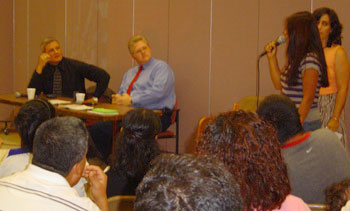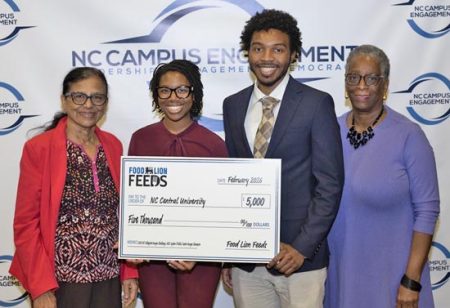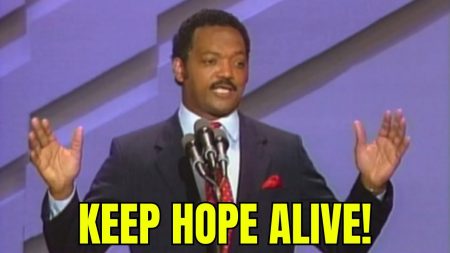Latino Community Seeks Explanation for Proposition 287g
By staff reports
In October Buncombe County Sheriff Van Duncan and Major Rusty Sweezy, Director of the Buncombe County Detention Center, spoke to a standing-room-only crowd at St. Eugene’s Catholic Church in Asheville to address fears surrounding the Sheriff’s plans to collaborate with ICE (Immigration and Customs Enforcement) to deport criminals who are undocumented.
Sponsored by a group of concerned community members, the town-hall style event drew a much larger crowd than expected — approximately 400 people — and initiated what the organizers hope to be an ongoing dialogue between Sheriff Duncan, Major Sweezy, and the Latino Community. Featured events included a presentation about immigrant realities here in WNC, an address to the crowd by Sheriff Duncan, and a Q&A session at the end.
 |
| Sheriff Van Duncan and Major Rusty Sweezy listen as a member of the local Latino community speaks about proposition 287g. Althea Gonzalez, (far right), a local Latino Community Activist was one of the moderators for this event. |
For some time information has been circulating by word
of mouth that some nearby counties have sought to collaborate with ICE.
However, this is not just a local effort. Proposition 287g awards
federal funding to train and certify local officers to enforce
immigration law, and ICE has received more applications from North
Carolina than from any other state. In light of this, the North
Carolina Sheriff’s Association, with support from Republican Senator
Elizabeth Dole, plans to work with ICE on a statewide level. In fact,
this year the NC General Assembly appropriated $750,000 to train local
law enforcement, and representatives from ICE presented a proposed plan
for statewide partnership at the North Carolina Sheriff’s Association’s
fall meeting this month.
However, the decision to collaborate with ICE remains with local law
enforcement, since each county must apply for and develop its own
Memorandum of Understanding (MOU) with ICE. Currently there are four
counties in North Carolina that have MOUs (Mecklenburg, Gaston,
Cabarrus, and Alamance), each one unique in its scope. Interestingly,
some MOUs were developed with community input, and others without.
Nevertheless, as this policy looms on the horizon, many in the local
Latino community fear that local law enforcement will profile and
target all Latinos. Stricter laws for obtaining a NC driver’s license
have resulted in many undocumented immigrants driving without a
license, thus making them an easy target for a routine traffic stop.
The situation can quickly become complicated, though, if the
undocumented driver has no form of identification whatsoever. According
to Sheriff Duncan, that person would be taken to the Magistrate’s
office and required to provide some sort of proof of their identity.
Meanwhile, larger and more integrated law enforcement databases mean
that local law enforcement can access information about a person’s
immigration status from their patrol cars. Another fear is that this
measure would lead to the separation of families. Given the high stakes
of the issue, it is no wonder that people are afraid.
Duncan insisted to the crowd that only undocumented criminals would be
deported, but what constitutes a criminal? Is this someone who’s
already been convicted, or just arrested? Could a simple speeding
ticket trigger the activation of an old deportation order? Despite
Sheriff Duncan’s best efforts to calm the public’s worries, as the
meeting ended one person addressed the crowd by asking if they were
still afraid, and the crowd responded with a resounding “yes!” One
positive outcome of the meeting is that the Sheriff has said he is
willing to continue the dialogue with leaders of the Latino community,
so there is a second meeting in the planning stages.
Surely strong community involvement in this ongoing dialogue will
mitigate the potentially divisive effects of 287g and minimize the
apparent anti-immigrant slant of this proposition.








